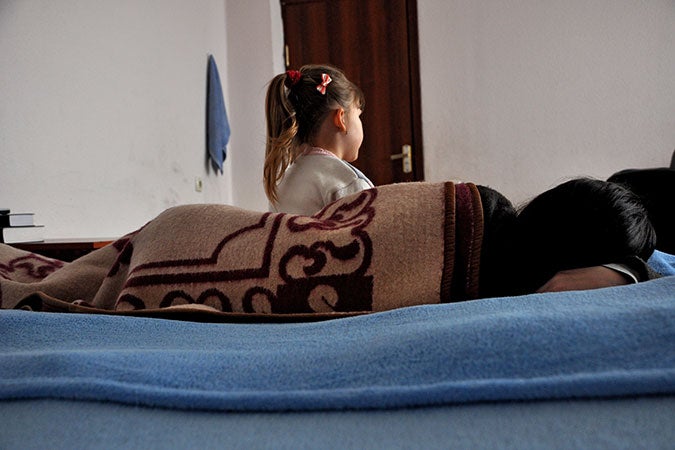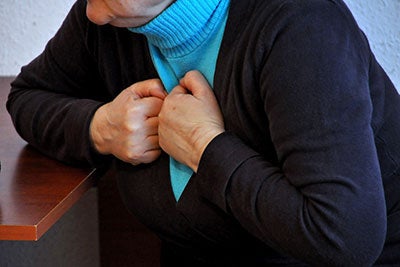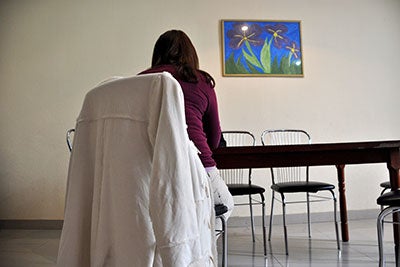Shelters offer new lease on life in Georgia
Safe and child-friendly, Georgia’s domestic violence shelters, set up with UN Women support, give women job training and medical, psychosocial and legal assistance to help them rebuild their lives.Date:
Mariam* spent five years with an abusive husband. She often wanted to leave with her daughter but had nowhere to go—even her mother refused to take her back.
With a social worker’s help, the 29-year-old applied to a domestic violence survivors identification group. After receiving official survivor status, she and her 8-year-old daughter moved into a State-run domestic shelter six months ago and started rebuilding their lives.

“If not for the shelter, my daughter and I would probably still be living in violence,” Mariam says: “I gained freedom and trust here and learned to stand strong. Before, I could almost never leave home—my husband controlled my every step. Now, no one restricts me. I make all the decisions on my own. ”
Mariam’s shelter is one of four state-run domestic violence shelters UN Women helped the Government of Georgia establish as part of UN Joint Programme for Gender Equality, funded by the Government of Sweden. Located in Tbilisi, Gori, Kutaisi and Signaghi, the shelters are now funded and administered by the Government of Georgia’s State Fund for the Protection and Assistance to the Victims of Human Trafficking (State Fund).
Demand for the shelters continues to grow, indicating shifting public attitudes as well as persistence of domestic violence. A 2013 UN Women study on the public perceptions of violence against women found that 69 per cent of people interviewed in Tbilisi, Kakheti and Samegrelo-Zemo Svaneti believed domestic violence to be a crime.
Like Mariam, more and more women are seeking refuge from domestic violence in Georgia. Since 2011, more than 500 people have taken refuge at Georgia’s shelters, and demand has increased year-over-year, rising from 100 women in 2013 to 155 women in 2015, for example.

Safe, comfortable and child-friendly, the domestic violence shelters give women medical, psychosocial and legal assistance upon admission. In addition, since domestic violence survivors often don’t have a job or the education necessary to sustain an independent life, women receive vocational education, training and employment support.
Mariam will soon graduate as a manicurist. The vocational education centre where she takes her courses got her on-the-job training at a manicure salon, which has offered her work once she completes her education.
Providing survivors of domestic violence access to high-quality services is an important part of Georgia’s international legal obligations.
In 2013, Georgia joined UN Women’s COMMIT initiative, pledging to promptly respond to domestic violence through special hotlines, provide victims with shelter facilities, and ensure the safety of whistle-blowers, among other measures. In 2014, Georgia signed the Council of Europe’s Convention on Combating and Preventing Violence against Women and Domestic Violence (Istanbul Convention) and plans to ratify the Convention soon.
At the Global Leaders’ Meeting on Gender Equality and Women’s Empowerment in September 2015 in New York, Georgia’s then Prime Minister Irakli Gharibashvili pledged to make ending violence against women and girls and domestic violence a top priority. He stressed that the country will constantly revise and develop its National Action Plan on gender equality and ending domestic violence.

“Much remains to be done to expand the geographic coverage of Georgia’s shelters and increase the quality of services,” says UN Women Country Representative Erika Kvapilova, adding “but plans are underway and the commitment is there.”
The State Fund aims to increase access to services for survivors of domestic violence and make services more flexible. In the summer of 2016 a crisis centre will open and provide temporary accommodation to women reporting domestic violence before they are granted official survivor status. Specialized services for survivors of sexual violence will be developed later in 2016 and available by 2017.
Women from the shelters who’ve completed rehabilitation and started a new life, continue the fight to end domestic violence. They give advice to other survivors and guide them on how to overcome violence.
Mariam plans to carry on this tradition and start a new home. Once she begins work, she will pool her savings with municipal rental subsidy funds and child support from the shelter, and rent an apartment with her daughter.
“I only regret that I lost so many years and did not act sooner. My advice? Women facing domestic violence should never tolerate it,” Mariam says.
* Name changed to protect her identity